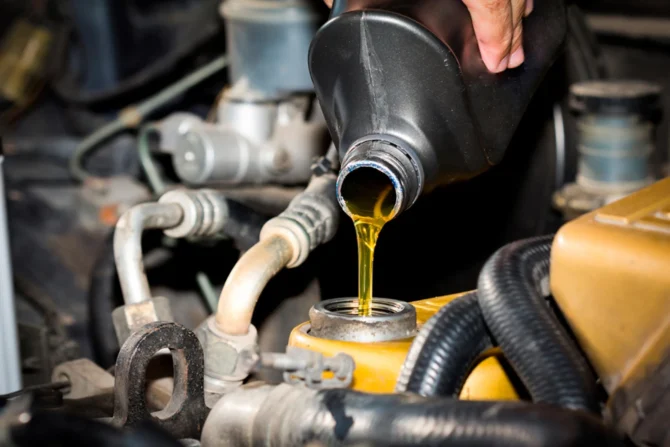
If you have a Kubota diesel tractor, is synthetic oil the best oil to use? In our humble view, the answer is affirmative. We’ll make an effort to defend our viewpoint as best we can. The notion that synthetic oils are a preferable alternative for diesel engines is backed up by a plethora of real-world experience and empirical facts that you can check out below:
What Is the Best Kubota Tractor Oil?

Source: fginsight.com
The Kubota L3901 is powered by a 37.5-hp engine. Known for their durability and power, Kubota diesel engines provide outstanding horsepower while also being more fuel-efficient and cleaner-burning thanks to the Common Rail System (CRS) with digitally controlled direct fuel injection. The engines are compliant with the EPA’s most current Tier 4 final emission requirements.
The 24.8 horsepower (18.5kW) engine of the Kubota L2501 meets with the most rigorous EPA Tier 4 Final emission requirements. A gas-strut-assisted hood opening also makes maintenance easier. Your Kubota tractor’s engine will be better protected from wear and tear if you use a high-quality synthetic diesel tractor oil. This kind of synthetic diesel engine oil enables Kubota diesel engines to work optimally and excel in extreme temperature situations.
Kubota recommends using a 15W-40 viscosity engine oil in the absence of a 10W-30. A high-performance synthetic diesel oil helps your Kubota diesel engine use less oil. Both the viscosity and oxidation resistance will be maintained.
The difference between conventional and synthetic
When comparing standard diesel engine oil to synthetic diesel engine oil, it is necessary to evaluate the molecular structure of each. Conventional lubricants are made from crude oil and refined. Oxygen, sulfur, and nitrogen are all naturally occurring impurities in crude oil. Along with these components, crude oil includes metals such as vanadium and nickel that cannot be removed during the refining process.
Throughout the refining process, the many compounds included in crude oil are separated by weight. This means that the different types of oils obtained through processing have similar molecular weights but separate or dissimilar structures. The molecular structure of petroleum and mineral-based base stock oils varies, which causes them to operate unevenly and irregularly, resulting in more fluid friction than is desirable.
Synthetic motor oil is manufactured chemically in such a manner that the resultant base stock oils are completely free of contaminants. They are purposefully constructed to have no undesired contaminants or byproducts and to include only beneficial chemicals designed for specific purposes. Synthetic base stock oils have a stable molecular structure due to their purity and flexibility. They provide superior performance qualities due to their molecular structure, including less friction, enhanced fuel efficiency, increased film strength, and improved extreme temperature performance. The expert info here shows that the synthetic oils are far better than the conventional lubricants when it comes to performance, molecular compound, and price and durability
Diesel Engines Get Maximum Protection

Source: familyhandyman.com
For a diesel engine oil, preventing metal surfaces from touching and causing excessive wear is the main goal. The only thing that separates the metal surfaces is a minuscule layer of coating. A high-quality synthetic motor oil forms a much tougher fluid film than conventional lubricants. Synthetics are better since their base stock oils are more robust and long-lasting. As a result, your diesel engine will run smoother and last longer thanks to their superior wear and friction reduction capabilities.
When a diesel engine loses performance and horsepower, has poor fuel economy, loses compression, and uses more oil, it is reasonable to infer that these issues are the result of excessive ring and cylinder lining wear. The goal of high-quality synthetic oil manufacturers is to create a diesel engine oil that will minimize, if not eliminate, the unnecessary wear on the cylinder and ring seals of diesel engines.
The best synthetic diesel engine oils for Kubota tractors may give up to six times as much wear protection as conventional diesel engine oils. This adds an additional layer of security and protection to a diesel engine.
Controlling Viscosity
Diesel engine manufacturers specify a viscosity for their engines. Extensive testing has been conducted, and diesel engine engineers have identified the optimal viscosity grade for specific engines. Choosing the correct viscosity and adhering to the guidelines of the engine manufacturer is essential. Additionally, it is the diesel engine oil manufacturer’s responsibility to create an engine oil capable of withstanding the severe demands and difficult operating conditions encountered in an engine.
The engine oil manufacturer must also provide an engine oil that maintains its viscosity throughout the recommended service life provided in the owner’s manual. Regrettably, many manufacturers of conventional and synthetic engine oils manufacture engine lubricants to meet the bare minimum criteria and maximize profit margins. Despite their cheap price, these poor-quality diesel engine oils are unable to provide the level of protection necessary for a heavy-duty diesel engine.
Look for an engine oil company whose goal is to supply the greatest synthetic diesel engine oil available, surpassing even the most basic industry criteria. Performance should take precedence before cost. It is essential for a synthetic diesel engine oil designed for Kubota tractors to be resistant to oxidation and the thickening effects of soot pollution, which is common in diesel engines.
The best and strongest detergent/dispersant additives must be used in the additive chemistry of a high-performance synthetic diesel engine oil. The goal of this strengthened detergent/dispersant package is to maintain the suspension of soot particles. Retaining small soot particles in the oil helps to keep bigger, wear-causing particles at bay. Viscosity variations can be minimized by reducing wear caused by soot.
Due to the high-grade synthetic base oils utilized and their ability to withstand very high temperatures, a high-quality synthetic diesel engine oil will have less volatility. This kind of oil offers the highest level of protection and efficiency for diesel engines.
Exceptional Performance Across a Broad Temperature Range
Conventional diesel engine oils include wax, which may cause the oil to thicken at sub-zero temperatures. 80 percent of wear happens during cold, dry starts. When conventional oil thickens at lower temperatures, it becomes more difficult to start, restricts oil flow, and causes the engine to wear out earlier than it would otherwise. It is best to use a wax-free synthetic diesel engine oil, which flows freely and quickly in cold temperatures. As a consequence, the engine starts more easily, wear is reduced, and oil flow to critical engine components is enhanced and more efficient.
Conventional oils lose their thermal stability as engine temperatures increase, which means they begin to deteriorate when heated. The oxidation that occurs as a consequence of thermal breakdown keeps engine deposits like sludge at bay. As previously stated, mineral or petroleum base stock oils include unwanted byproducts or contaminants, which worsen the deposit accumulation produced by the thermal breakdown of conventional oils.
High-quality synthetic base oils, on the other hand, are significantly more resistant to thermal or heat deterioration than conventional oils.
Reduction in Oil Consumption

Source: agriland.ie
In order to safeguard your diesel engine, you need a lubricant that is both thermally stable and homogenous in its molecular structure, both properties of synthetics. When an oil is heated to very high temperatures, it burns away or becomes volatile. Typical mineral or petroleum-based oils are especially susceptible to this phenomenon because their uneven chemical structure allows the lighter molecules to evaporate or burn away when exposed to heat.
True synthetic high-performance diesel engine oil will be far less volatile than the API limit. This reduces oil consumption, reduces the frequency with which engine oil must be filled up, and reduces vehicle emissions from an environmental aspect, all of which contribute to lower oil costs. A high-quality synthetic diesel engine oil has a low rate of combustion or volatility, enabling less engine oil vapor to reach the combustion chamber and reducing oil consumption during engine operation.
It’s a win-win situation for diesel vehicle owners since they’ll save money on engine oil while also lowering dangerous pollutants from their vehicles/diesel equipment. You’ll have more money in your pocket if you reduce your oil use.
Conclusion
Let us now consolidate the facts and information presented in order to address the following question: what is the best oil for Kubota diesel tractors? Fuel efficiency and wear protection are both improved by using synthetic lubricants. The lubricant’s viscosity will be much better maintained than with standard lubricants. Additionally, we addressed how synthetic oils provide improved protection across a wider temperature range, both cold and hot, as compared to conventional oils.
Oil consumption will be reduced and drain intervals will be extended by using synthetics. To summarize, synthetic oils are a far superior choice for diesel engines and offer incredible benefits to diesel vehicle owners in terms of increased equipment longevity, increased fuel economy, decreased oil consumption, and decreased downtime, all of which contribute to the bottom line of any professional diesel equipment operation.



